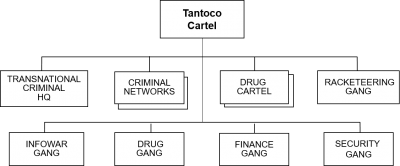Difference between revisions of "Tantoco Cartel"
(PDFBook Category test) (Tag: Visual edit) |
(Removed PDFBook Category test) (Tag: Visual edit) |
||
| Line 16: | Line 16: | ||
[[Category:Olvana]] | [[Category:Olvana]] | ||
[[Category:Non-State Threat Actors]] | [[Category:Non-State Threat Actors]] | ||
| − | |||
Revision as of 20:44, 9 October 2018
The most prominent transnational criminal organization in South Torbia is the Tantoco Cartel. The Tantoco Cartel is based in Manila, but its tentacles reach throughout the country and into Belesia, Gabal, and Olvana. The Tantoco Cartel may have even have inroads into North Torbia. The Tantoco Cartel is involved in numerous criminal activities: drug and weapons smuggling, extortion, motor vehicle theft, illegal gambling, money laundering, counterfeiting, and murder-for-hire.
The leader of this cartel is Hilmi Tantoco, a 67-year old male who operates a string of businesses under the umbrella company known as Tantoco Enterprises. A native of South Torbia, Hilmi Tantoco got his start as an enforcer with a local gang involved in racketeering—primarily extortion—from small business owners. He worked his way up until, in his mid-30s, he ousted the local gang leader by bombing his boat while he was deep-sea fishing. Hilmi then set up a number of legitimate businesses to serve as a front for his illegal activities. His political and social connections are thought to be extensive, including local police and politicians, as well as the federal police and some cabinet members. These connections allow him to stay one step ahead of most attempts to close down his businesses. There is enough distance between him and his illegal practices that if necessary, a fall guy will be found to prevent any investigation reaching him.
Since most of the Cartel's operations are non-violent, the Cartel is able to maintain its fiction as an apolitical, beneficent, loose business conglomerate. While their methods are often questionable, they do perform charitable acts, such as donating and delivering supplies to homeless victims. These activities make the relationship between organized crime and police a complicated one. Membership itself is not illegal, and Cartel businesses and headquarters are often clearly marked. Police often know member whereabouts and activities without taking any action. Some South Torbians view the criminals as a necessary evil, in light of their chivalrous facade, and see the organizational nature of their crime as a deterrent to impulsive individual street crime. To counteract this romanticized version, the police refer to the group as essentially thugs or scum to reinforce their criminal nature corresponding with the government imposing stricter laws against criminal organizations.
The Cartel has taken advantage of the technological advantages in South Torbia to jump to the forefront of cybercrime. Often hiring bright but financially struggling recent university graduates, the Cartel pays for side work in cyber-theft of both real and virtual assets, as well as "hacking for hire." They also assist in the Cartel's largest and most profitable operation: large-scale bribery and blackmail.
Another major activity is theft and smuggling. According to the International Union of Maritime Insurance, last year the total loss (shrinkage) through the Port of Manila equated to 240,000 twenty-foot equivalent units, with an estimated value of $6.3 billion, with an estimated annual increase of 2.0% by shipping volume and almost 24.98% by value. With over three-fourths of this loss attributed to theft, industry analysts credit criminal organizations with shifting to higher-value items, often of military origin, rather than the more pedestrian civilian black market items. Smugglers avoid paying transaction taxes on gold by using travelling retirees as mules. This crime is appealing since this typically has no victims except state coffers, and does not call for violence or weapons. People see it as an easy way to earn extra cash, almost like a part-time job. Prior to a tax increase a decade ago, police arrested about 10 people on suspicion of gold smuggling-related tax evasion in a typical year, while last year there 294 arrests. Furthermore, organized crime is involved with smuggling MDMA and cannabis from North America into the country, or, in coordination with African drug smuggling cartels, methamphetamines from Latin America, Olvana, and Africa. Contrary to most countries, South Torbia imports the majority of its cannabis rather than local sourcing; this creates unusually high retail prices for the drug. Additionally, South Torbia faces a prescription medication problem, with over 50% of all drug-related treatment in the nation relating to amphetamine-type substance abuse.

